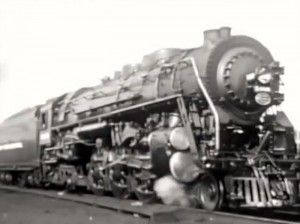
"The Steam Locomotive, second release in the Know Your Railroad series, sponsored and produced by the Motion Picture Bureau of the New York Central System, is a worthy successor in this intelligent line of educational films. In it, Frederick G. Beach, supervisor of the bureau, has set forth in clean cut cinematography the design, construction, operation and maintenance of the famous Hudson type locomotive. An animated model of a steam cylinder explains the otherwise hidden functions of this key piece of machinery, while a soundly conceived narrative points up the film's visual teaching throughout. A stirring sequence showing these great coal eating giants at their daily tasks brings the picture to a dramatic close." Movie Makers, Dec. 1944, 495.
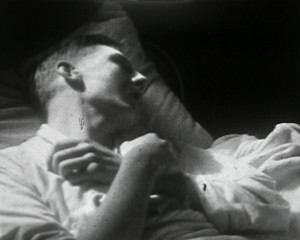
"Amateur filmmaker, cinema historian and railway engineer H.A.V. Bulleid presents a tale of paternal foreboding and rural tragedy. When a man dies, his widow seeks a suitable replacement to care for her and their son. Torn between two rival suitors - Dr. Vincent Moire and the mysterious Richard Grafton - the mother is unable to make a decision, despite her son expressing a clear preference for the doctor. When he is called away to town, Grafton seizes his opportunity and, wanting rid of the boy so that he might live with the mother in peace, shoves him over a cliff to his death. But when Grafton returns to the village, he spots the doctor - who has made an unexpected return - walking arm in arm with the widow. Distraught and defeated, Grafton claws at his neck and face in desperation, reaches into his jacket, pulls out a gun and kills himself." (EAFA Database)
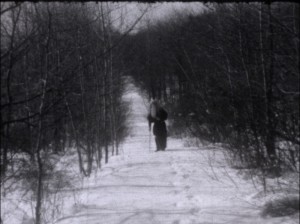
Amateur film club production that parodies Russian tragedy literature. The story revolves around two warring families, the Yagustynkas and the Chenstohovas, a romance, a religious curse, and murder. Exaggerated intertitles contribute to the film's "burlesque" of Russian culture and literature.
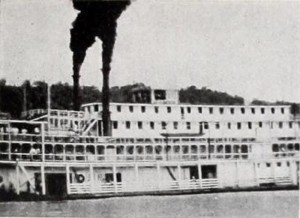
"The romance and color of a trip down the Ohio River on one of the Greene Lines few remaining flat bottomed passenger steamers are used to good advantage by Sidney Moritz in Sternwheeler Odyssey. The variety of the passing landscape, stops at wharves en route, with all the confusion of ropes, cargo and roustabouts, and general views of the stately river traffic plying the waterways gives this friendly little picture a touch of glamour. On board, the passengers and crew including "Ma" Greene, America's only woman river captain, present lively camera material. The churning paddle wheel, filmed from various angles, and the cascading waters that flatten into arcs of waves in the wake of the boat, become a motif that sustains the feeling of a ship in motion throughout the picture." Movie Makers, Dec. 1942, 508.

"Working still in the same lyric mood which inspired In The Beginning and Consider The Lilies (place winners of earlier years), Fred C. Ells has turned this year to the Twenty Third Psalm for the theme of Still Waters. In it, to use his own words, he has tried "to bring to mind some of the beauties of the natural world, and to make the spectator conscious in some small way of the mysterious, wonderfully planned creation in which we live. The picture is pure lyric from start to finish, with no more continuity than a love song." Mr. Ells has, on occasion, been thrillingly successful in fulfilling this high charge, bringing to the screen some of the most stirring beauty it would seem possible to recreate. The cumulative effect of the relatively short study, however, is weakened by imperfect technique in the preparation of the Biblical title wordings." Movie Makers, Dec. 1938, 620.
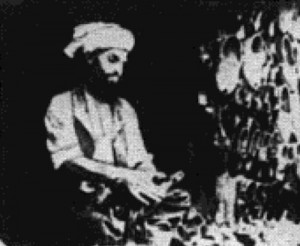
"The Stones of Eden is a documentary on the modern day life of a common wheat farmer in Afghanistan. Today he ekes out his living about the same as he did 2000 years ago. We see him fasten the yoke to his oxen and till the hard dry soil with a primitive plow. Five times a day he stops to kneel in prayer, no matter where he is. We see the grinding of wheat and the baking of bread. At the village the farmer exchanges his wheat for a few necessities, then leaves the village, his only contact with the 20th Century, for his fortified walls of stone to keep out wild animals, human enemies, and other fears. The film won the MPD Student Film Award" PSA Journal, Sept. 1965, 50.
"Our hero discovers a way to make 'clones' of himself and puts on a show – including four clones singing a barbershop quartet." Oldfilm.org
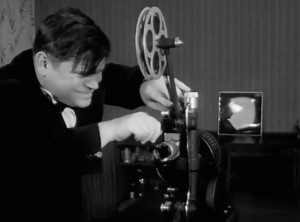
"Stop the Projector, I Want To Get Off features James Weatherburn as the bumbling projectionist who is trying to learn how to run one of the fool contraptions. His attempts are not quite all-out comedy, yet his antics are amusing, and anyone who remembers the day he first tried to run one of these complicated machines will be amused at someone else's interpretation of what the sensation is like" PSA Journal, Sept. 1966, 35.
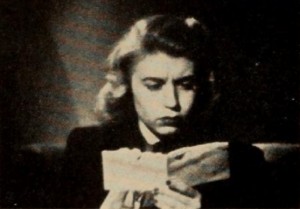
"Although there is no actual violence portrayed in this psychological thriller, Storm Due — in which a young wife discovers her husband to be a murderer — is instinct with mounting tension and terror. Francis J. Barrett's film is a potent combination of several related elements. Wedded almost as one are dramatic, hard-hitting camera angles and the visual stimulus of brilliant, low-key lighting. Acting of theatrical calibre by the young wife is accented by an off-stage voice which underlines her fears — a technique that suggests a loan from the best in modern radio. A taut continuity only hints at the story line as it hurries through this exciting evocation of violence. This very economy of dramatic exposition, in fact, will make Storm Due an unpopular and often misunderstood production. For these reviewers, however, it remains creative cinema of a very high order." Movie Makers, Dec. 1949, 454-455.
Total Pages: 203